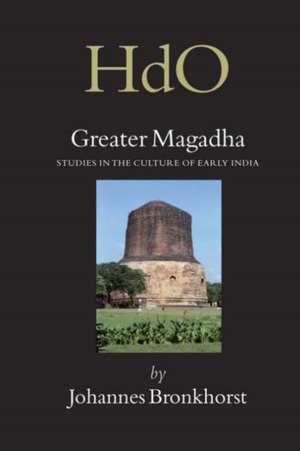Greater Magadha: Studies in the Culture of Early India: Handbook of Oriental Studies. Section 2 South Asia, cartea 19
Autor Johannes Bronkhorsten Limba Engleză Hardback – 29 apr 2007
Din seria Handbook of Oriental Studies. Section 2 South Asia
- 18%
 Preț: 2384.17 lei
Preț: 2384.17 lei - 18%
 Preț: 966.72 lei
Preț: 966.72 lei - 18%
 Preț: 1077.85 lei
Preț: 1077.85 lei - 18%
 Preț: 1002.33 lei
Preț: 1002.33 lei - 18%
 Preț: 1001.48 lei
Preț: 1001.48 lei - 18%
 Preț: 970.37 lei
Preț: 970.37 lei - 18%
 Preț: 717.44 lei
Preț: 717.44 lei - 18%
 Preț: 1223.87 lei
Preț: 1223.87 lei - 18%
 Preț: 1372.69 lei
Preț: 1372.69 lei - 18%
 Preț: 806.18 lei
Preț: 806.18 lei - 18%
 Preț: 662.42 lei
Preț: 662.42 lei - 18%
 Preț: 739.89 lei
Preț: 739.89 lei - 18%
 Preț: 717.98 lei
Preț: 717.98 lei - 18%
 Preț: 920.78 lei
Preț: 920.78 lei - 18%
 Preț: 939.78 lei
Preț: 939.78 lei - 18%
 Preț: 701.04 lei
Preț: 701.04 lei - 18%
 Preț: 1657.57 lei
Preț: 1657.57 lei - 18%
 Preț: 2276.44 lei
Preț: 2276.44 lei - 18%
 Preț: 941.65 lei
Preț: 941.65 lei - 18%
 Preț: 753.78 lei
Preț: 753.78 lei - 18%
 Preț: 707.98 lei
Preț: 707.98 lei - 18%
 Preț: 1239.00 lei
Preț: 1239.00 lei - 18%
 Preț: 1078.52 lei
Preț: 1078.52 lei
Preț: 910.28 lei
Preț vechi: 1110.09 lei
-18% Nou
Puncte Express: 1365
Preț estimativ în valută:
174.18€ • 179.70$ • 145.36£
174.18€ • 179.70$ • 145.36£
Carte indisponibilă temporar
Doresc să fiu notificat când acest titlu va fi disponibil:
Se trimite...
Preluare comenzi: 021 569.72.76
Specificații
ISBN-13: 9789004157194
ISBN-10: 9004157190
Pagini: 414
Dimensiuni: 155 x 235 x 31 mm
Greutate: 0.94 kg
Editura: Brill
Colecția Brill
Seria Handbook of Oriental Studies. Section 2 South Asia
ISBN-10: 9004157190
Pagini: 414
Dimensiuni: 155 x 235 x 31 mm
Greutate: 0.94 kg
Editura: Brill
Colecția Brill
Seria Handbook of Oriental Studies. Section 2 South Asia
Public țintă
All those interested in Indian studies (history, religion, archaeology, etc.), religious studies, and the history of philosophy.Notă biografică
Johannes Bronkhorst, Ph.D. (1979) University of Poona, doctorate (1980) University of Leiden, is Professor of Sanskrit and Indian studies at the University of Lausanne (Switzerland). He has published extensively on Indian thought in its various manifestations.
Recenzii
'Professor Bronkhorst's book is a valuable contribution that will stimulate debate among scholars and students and encourage them to re-examine ideas about the nature of Early Indian culture that are often taken for granted.'
Richard Fynes, De Montfort University, Leicester, Journal of the Oxford Centre for Buddhist Studies. 1:1
'[…] this book provides a thought provoking interpretation of the early history of India. It is meticulously researched, well written, well argued, and ampy annotated book. […] rich and rewarding.'
K.T.S. Sarao, Orientalische Literaturzeitung 103/2 (2008)
'Con How the Brahmins Won si chiude, forse, il discorso iniziato con la pubblicazione di Greater Magadha, eppure ancora tante sono le finestre appena schiuse, soprattutto quando si cerca di mettere in dialogo fonti sanscrite, prācrite, greche e cinesi. Certamente, questi tre volumi tutti insieme danno un contributo irrinunciabile per cono 150 marianna ferrara scere le operazioni politiche e propagandistiche, le narrative e le retoriche, le storie individuali e collettive attraverso le quali i brahmani sono riusciti a imporre l’ideologia che ne ha preservato l’autorevolezza e l’autorità per secoli. E all’ombra di questa storia apparentemente a lieto fine per la classe brahmanica, tante altre ancora dovranno essereraccontate, non senza sorprese.'Marianna Ferrara, Historia Religionum 11 (2019)
Richard Fynes, De Montfort University, Leicester, Journal of the Oxford Centre for Buddhist Studies. 1:1
'[…] this book provides a thought provoking interpretation of the early history of India. It is meticulously researched, well written, well argued, and ampy annotated book. […] rich and rewarding.'
K.T.S. Sarao, Orientalische Literaturzeitung 103/2 (2008)
'Con How the Brahmins Won si chiude, forse, il discorso iniziato con la pubblicazione di Greater Magadha, eppure ancora tante sono le finestre appena schiuse, soprattutto quando si cerca di mettere in dialogo fonti sanscrite, prācrite, greche e cinesi. Certamente, questi tre volumi tutti insieme danno un contributo irrinunciabile per cono 150 marianna ferrara scere le operazioni politiche e propagandistiche, le narrative e le retoriche, le storie individuali e collettive attraverso le quali i brahmani sono riusciti a imporre l’ideologia che ne ha preservato l’autorevolezza e l’autorità per secoli. E all’ombra di questa storia apparentemente a lieto fine per la classe brahmanica, tante altre ancora dovranno essereraccontate, non senza sorprese.'Marianna Ferrara, Historia Religionum 11 (2019)
